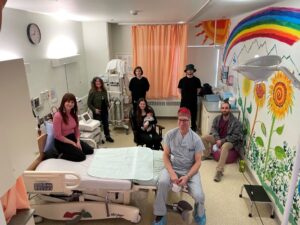
Providers in rural, remote and Indigenous communities are commending the support they are getting from Pediatricians who are members of the Real-Time Virtual Support (RTVS) team.
RTVS pathways were rolled out in April 2020, in part, as a response to the COVID-19 pandemic.
The goal was to enhance health equity in rural, remote, and Indigenous communities across British Columbia by connecting rural healthcare providers and patients to RTVS Virtual Physicians via Zoom or telephone.
The pediatric pathway – also known as CHARLiE (Child Health Advice in ReaL-Time electronically) – rolled out in July 2020. It has been especially welcomed in communities where there is no pediatric support or gaps in pediatric support.
Hazelton and surrounding Gitxsan communities has a population of about 8,000 and is supported by midwives, family physicians, and nurse practitioners but there are no pediatricians. The nearest on-call pediatrician is hundreds of kilometres away and neighbouring towns are inaccessible in bad weather.
Hana Lang is a Registered Midwife from Hazelton and a frequent user of the CHARLiE line.
One of the things she loves about the service is how much the person at the other end of the line understands what resources are available at her hospital.
“They’re incredibly supportive. I think these Pediatricians understand that we’re working in an under-resourced area. They help us navigate things like the Patient Transfer Network (PTN) and are always willing to communicate directly with parents using the RTVS interface.”
She has called CHARLiE on multiple occasions – for both emergency and non-urgent care. For a couple of the cases, CHARLiE physicians have assisted her in stabilizing an infant for transport to a larger hospital.
Lang said: “Knowing we can access CHARLiE to help us support the stabilization of an unwell newborn, I feel much more confident delivering babies in a remote area.”
Knowing we can access CHARLiE to help us support the stabilization of an unwell newborn, I feel much more confident delivering babies in a remote area.
Hana Lang
For nurse Glenda Bertolucci, in Port Alberni, CHARLiE has also been an important resource. She did not use the service when it was first launched but got introduced to it through her Continuous Quality Improvement (CQI) work with the Rural Coordination Centre of BC’s Rural Surgical and Obstetrical Network (RSON).
Port Alberni, on Vancouver Island, sees around 300 births per year, but the community has just one Pediatrician and one OB, two family doctors that do deliveries and one midwife. The community has vacancies for Pediatricians but they have not yet been filled.
The maternity-trained nurse said in recent months the CHARLiE service was instrumental in helping them stabilize a pre-term baby and an acutely ill toddler.
Bertolucci has been working as a nurse for more than 30 years and she said she believes that RTVS can also play a big role in recruitment and training.
“RTVS can help bring new pieces of education for providers. Accessing that is really helpful and can make people feel more supported.
“I think that this is something that could become a really good supporting foundation for practice especially in community and rural hospitals.”
Bertolucci added: “I think it’s interesting how COVID-19 has opened other doors that will be useful long-term for us. Even when everything gets down to normal, we are in a significant shortage for healthcare workers. Our providers that are delivering, two of them are in their 60s, and there’s no new ones coming up. It’s going to be tricky.”
Dr. David Wensley, Pediatrician at BC Children’s Hospital and the lead CHARLiE physician, said: “Pediatricians on the CHARLiE pathway are here to support all rural healthcare workers. We are all proud to contribute to more equitable access to quality healthcare in rural, remote and Indigenous communities.”
I think that this is something that could become a really good supporting foundation for practice especially in community and rural hospitals.
Glenda Bertolucci
Bertolucci added: “I think it’s interesting how COVID-19 has opened other doors that will be useful long-term for us. Even when everything gets down to normal, we are in a significant shortage for healthcare workers. Our providers that are delivering, two of them are in their 60s, and there’s no new ones coming up. It’s going to be tricky.”
Dr. David Wensley, Pediatrician at BC Children’s Hospital and the lead CHARLiE physician, said: “Pediatricians on the CHARLiE pathway are here to support all rural healthcare workers. We are all proud to contribute to more equitable access to quality healthcare in rural, remote and Indigenous.